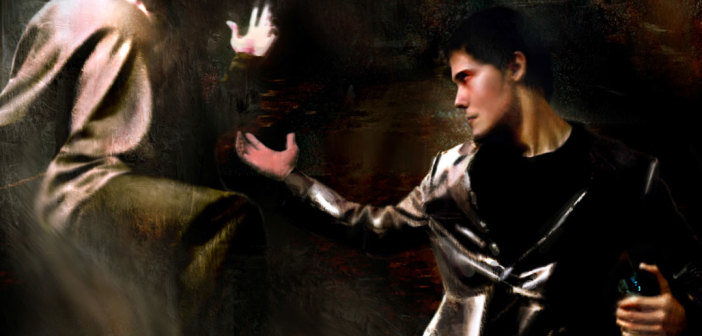The devil’s personal banker of souls is roaming the earth in Aposperos, and he’s never looked so good. For anyone who’s ever been trapped in an inescapable corner, there’s a way out, and Nikolaos “Niko” Carris is willing to offer his help—for a price. All it will cost is one’s soul, and once the goods are delivered, Niko will come collecting for his payment.
This is the premise established by writer Nektarios Chrissos and artist George Martzoukos in the premiere issue of Aposperos, a digital series published by Visionary Comics. I say this with disappointment, because I’ve finally found a true gem of an independent book that’s worth the paper it’s printed on and the ink it’s printed with; but here, it’s in digital format only. Why is it that so many bad books find themselves in print, while this truly good one is left haunting the fringes of the digital era? I’m afraid we’ll never know.
But regardless of the publication format of Aposperos, don’t miss this book. It’s a feast for the imagination, beginning on the very first page with the investigation of a potential suicide, a tragedy being investigated by Inspector Papadakis of the Athens Police Department (that’s Athens, Greece, to be clear). This may sound routine, but there’s an entrancing texture to this book that’s an entire experience in itself. Artist Martzoukos is to thank for this: his artwork is a spellbinding dream to look at. I’m not sure how he creates his images, but if I were to guess, I’d imagine he and writer Chrissos set up live scenes with actor-models and capture them photographically, much like a fumetti project. Martzoukos then probably feeds the images into a computer, and uses a program to “paint” them, transforming the photos into the spooky shots that populate the book.
This technique glows with haunting realism as we are introduced to the diary entries of the suicide victim, Maria Kalidou, a woman desperate to find a cure for her cancer-stricken husband. So desperate is she that she allows herself to be seduced by the stunningly handsome Niko Carris, who offers her a deal she can’t refuse: for the price of her soul, he can restore her husband back to full health.
This event is the catalyst for a series that I hope will seriously and deeply explore the inner motivations of a man willing to work for the darker forces of life and death, manipulating the fears and utter hopelessness of individuals willing to do anything for some kind of salvation. We already are beginning to see Niko crack a little over his deal with Maria, which raises more questions about him than it does her. We know her situation, but nothing about his. Chrissos reveals that Niko is human in some way or another, which begs the question: how does someone become a merchant of souls for the forces of darkness?
The story that Chrissos is working with could have been a boilerplate horror comic, but he’s not allowing such a dismal fate; Aposperos is very much its own tale with its own unique characters and settings that are a real joy to engage with. And most importantly, Chrissos is taking his time. I cannot count how many books I’ve encountered that are nothing more than rushed and flat miniseries; the minute I see “#1 of 4” on the cover of a new comic, I immediately fear for its creative integrity. But not with Aposperos: the first issue is 47 pages in length, and it’s only just getting started.
After doing some brief internet research, I discovered that Chrissos isn’t a fulltime aspiring writer, but rather a trained lawyer who writes for leisure. How interesting, considering his book has a rhythm and beat that I rarely see in the initial endeavors of many creators who totally devote themselves to their work in comics. For example, there’s a magnificent sequence where the police inspector is reconstructing the scene of the initial suicide, and as he lays out his evidence and theories, we the readers are shown the actual events involving Niko and Maria as they align with the inspector’s hunches. It’s a true wonder to follow along with.
It’s rare that I pay much attention to a book’s lettering, but this is one of those rare occurrences where the actual style of the prose in the book matters, much like it did in Grant Morrison and Dave McKean’s Arkham Asylum. With lettering provided by Jacob Bascle, the diary scenes in the comic are written in lovely cursive, while the live speech of the characters is narrow and dreamlike. It’s rather effective, but there are times when it’s the one major failing of the book. Sometimes it’s just plain difficult to read, and I found myself squinting to figure out what some words were. I don’t know if this is an error with the quality of the review PDF I was reading, so I can’t know for sure how the lettering will appear on a digital or mobile device.
But that one error alone doesn’t have the capability to derail this book, which is a real treat—this is a project Chrissos, Martzoukos, and Bascle should take true pride in. Aposperos has endeared itself with me for its fantastic look and captivating characters, and I eagerly await the next issue. The journey of Niko has only just begun, and already I want to know where his quest will lead him, and what we will find out about his own soul as a result.
That is, if he himself still has one.
This comic book review originally appeared on Broken Frontier on 12 March 2010.




